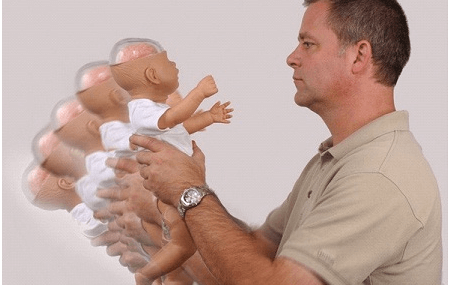Never shake a baby
What is Shaken Baby Syndrome?
No child, at any age, should ever be shaken.The effects can be very serious and can include lifelong injury or even death.Shaking is not first aid! If your baby is not breathing, shaking will not help.
Shaken Baby Syndrome occurs when a baby or young child is shaken violently and sometimes repetitively (over and over), with or without the head hitting something. The effects can be very serious and can include lifelong injury or even death.Shaken Baby Syndrome is a type of abusive head trauma, which can cause:
- Damage to a child’s brain.
- Permanent disabilities, like blindness or paralysis.
- Death.
Children less than 1 year old are the most at risk because they cry more often, but older children can also be seriously injured if they are shaken violently. No child, at any age, should ever be shaken.
- What can parents do to help soothe a crying baby?
- What if my baby keeps crying?
- Signs that indicate a baby has been shaken?
- Check to see whether the crying is a signal that your baby needs something specific, like a diaper change, feeding, relief from being too hot or too cold, attention, or has a fever.
- Hold your baby. This will not spoil him. However, some babies do not like being passed from person to person.
- Wrap or swaddle your baby in a soft blanket.
- Turn off the lights and keep surroundings quiet. Too much stimulation can trigger crying or make it worse.
- Soft music, white noise or a gentle shushing noise can soothe some babies.
- Many babies are soothed by motion. Try walking with baby in a sling or in a stroller. Rock or sway with baby in a gentle, rhythmic motion. Or try going for a car ride.
- Sucking sometimes helps babies to calm and relax. You can provide this by allowing your baby to breastfeed or by offering a pacifier.
- Give your baby a warm bath.
If your baby continues to cry after you’ve made sure there’s no specific problem, try to stay calm and be aware of how you feel. Are you upset? Are you frustrated? Are you angry? Take a moment to relax.
Here are some suggestions to help calm yourself:
- If you feel like you might lose control, stop! Place your child safely in the crib, take a time-out and leave your child’s room for as long as it takes you to feel calm.
- Take slow and deep breaths.
- Cry.
- Take a shower.
- Talk to a friend, family member, neighbor, or anyone else you trust, and get some support. Ask a trusted person to take care of your baby for a while so you can take a longer break.
- If you ever feel you may hurt your baby, call for help: a family member, neighbor, a local crisis line, your child welfare agency, or police. Check the first pages of your local phone book for the emergency numbers in your area.
It’s a good idea to have plan in place before you become upset or frustrated. Have a list of helpful numbers handy and clearly posted for all caregivers.
There are often no marks or bruises on the baby’s skin. Common signs include:
- Unusual sleepiness or extreme fussiness.
- Refusing to eat, poor feeding or vomiting for no apparent reason.
- The baby is no longer smiling, making eye contact, or babbling.
- Stiff body or seizures (legs and arms become stiff or move in a repetitive, jerky manner).
- The baby’s body is limp.
- Difficulty breathing, or there is a change in breathing pattern.
- The baby’s eyes become unfocused or roll back.
What should you do if you think your baby has been shaken?
- Call an ambulance or go to an emergency room immediately.
Shaking is not first aid!
If your baby is not breathing, shaking will not help. The only way to help a baby breathe is mouth-to-mouth breathing (using the correct technique for young infants). Call ambulance and start mouth-to-mouth breathing.
Where can parents go for help and support?
Being a parent or caregiver is not always easy. A baby’s constant crying can be stressful and cause you to feel frustrated. You’re probably not sleeping much while trying to meet your baby’s needs around the clock.
Try to arrange for regular child care relief so you can get some rest. Find a friend, family member or someone else you trust who can look after your baby for periods while you get a break. If people that you trust offer help, accept it. Know your caregiver. Never leave your child with someone you don’t trust, someone who has violent reactions, or someone who is not comfortable with babies.
Make sure that everyone in contact with your baby understands the dangers of shaking. This includes older siblings who may accidentally injure the baby in rough play.
Remember, no matter how upset you feel, DON’T SHAKE YOUR BABY.
If you have concerns or questions, talk to your paediatrician, family doctor or a public health nurse, and look for local community resources that support parents.
If you think you might be struggling with depression, or know someone with a new baby who is, talk to your health care provider. Don’t harm a baby in a moment of frustration. The effects could last a lifetime.

